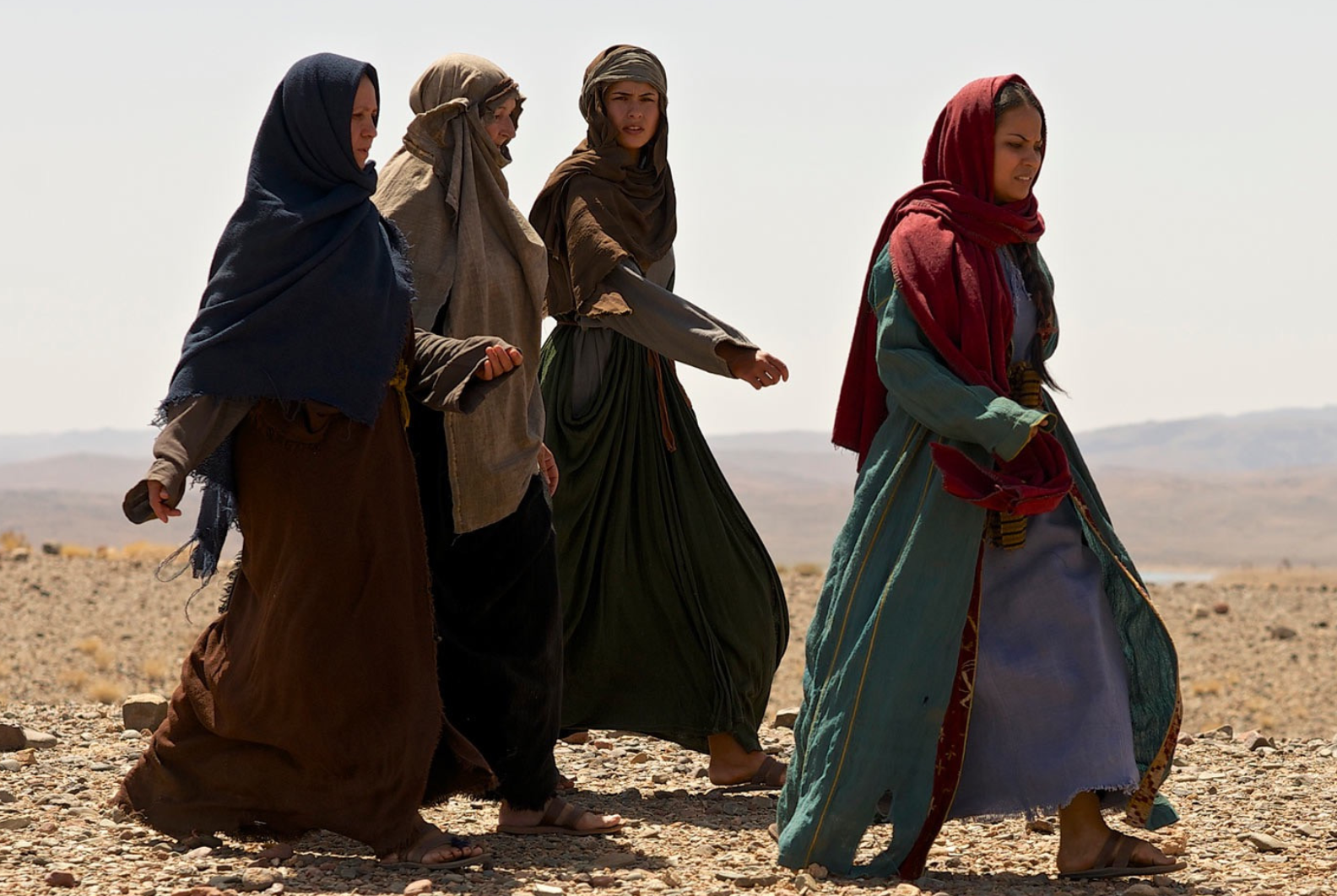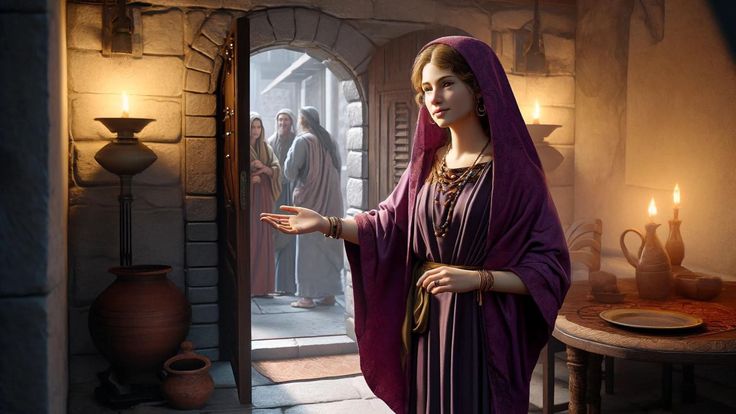If someone asked you to name some women in the Bible, who would come to mind?
Most of us are familiar with the story of Ruth’s unwavering loyalty and Esther’s bravery. Reflecting on the woman at the well’s life-changing conversation with Jesus and admiring Rahab’s courage and strategic role in the Israelites’ journey to the Promised Land, we can notice that women have played a vital role in God’s plan. They proclaimed the gospel, served their communities, and offered hospitality, wisdom, and leadership.
Beyond the well-known figures, many women contributed to the early church, and they are equally remarkable. We might know Priscilla, who tagged along and mentored new believers alongside her husband Aquila; Anna, the devoted prophetess who recognized Jesus as the Messiah and shared the news with all who would listen; Lydia, who used her resources to support the apostles and the spread of the gospel; or Phoebe, who served as a deacon, and she was trusted with delivering Paul’s letter to the Romans.
Let’s take a closer look at seven women in the New Testament whose stories reveal invaluable lessons about service, faith, and the power of women in God’s kingdom. Their influence still inspires the church today.

Mary
The most central and profound role in God’s redemptive plan is held by Mary, the mother of Jesus. Her importance is acknowledged in Acts, being mentioned among the believers gathered in prayer during Pentecost (Acts 1:14). The Gospel highlights Mary’s faith and obedient submission to God’s will. Her response to Gabriel’s announcement of her bearing the Son of God beautifully encapsulated what the Gospel says about her. “Behold, I am the servant of the Lord; let it be to me according to your word” (Luke 1:38).
When Mary received the divine message, her response was full of trust in God’s faithfulness, to her personally and to the people of Israel. Meditating on the promise of the coming Messiah, her powerful worship is seen in her song of praise in Luke 1:39–56. Mary gives voice to the themes of God’s mercy, justice, and fulfillment of His promises. Mary’s Magnificat is compared to the victorious hymns found in the Old Testament, hymns that celebrated God’s deliverance. These include songs sung by women like Deborah in Judges 5, Hannah in 1 Samuel 2, and Miriam in Exodus 15. Similar to these songs proclaiming God’s triumph over those who oppress His people, in her song. Mary exalts God’s favors towards the humble, the hungry, and the oppressed. She recognizes His enduring mercy “from generation to generation (Luke 1:50-55).
The Magnificat positions Mary as one of the earliest heralds of Christ’s redemptive mission. Being the mother of Jesus, she is aware of her unique role in God’s salvation story, and she submits herself with faith to His will. She becomes a jet figure in the unfolding of God’s covenant, finding fulfillment in the ministry and life of her Son, Jesus.
Anna
We encounter Anna in the familiar story of Jesus’s presentation at the temple of Jerusalem in Luke 2. She was a prophetess whose witness and life provided a profound example of faithful anticipation and recognition of the Savior. She is described as a woman with deep devotion, referred to as a “prophetess,” a title she shares with other significant women in the Old Testament (Deborah—Judges 4:4; Miriam—Exodus 15:20; Huldah—2 Kings 22:14; and Isaiah’s wife—Isaiah 8:3). Anna is divinely appointed to reveal God’s will even if her words were not directly recorded in the text.
Luke emphasizes Anna’s advanced age; he noted that she has been a widow for many years. Her status in society or age does not diminish her vital role in God’s kingdom, remaining steadfast in worship, prayer, and fasting “night and day” (Luke 2:37).
She constantly sought God’s presence in the temple, where she was able to recognize Jesus as the long-awaited Messiah in the moment Mary and Joseph brought him to be consecrated.
Anna’s response was immediate and profound, giving thanks to God and recognizing Him as the fulfillment of God’s promise to Israel. She spoke to all who were waiting for the redemption of Jerusalem and shared the good news of the Savior’s arrival (Luke 2:38).
She is an example of living a life of patient hope and faithful devotion, and she has a clear prophetic calling. With her eyes opening to behold the Messiah, she eagerly proclaimed God’s redemption to those around. Anna’s story serves as an invitation for us to live with a similar sense of expectation and attentiveness, actively recognizing God’s work and sharing the message of His salvation with others.

Martha and Mary
Two sisters from Bethany welcomed Jesus into their home, a story many people are familiar with, in Luke 10. Martha showed hospitality, taking care of the needs of Jesus and His disciples, while Mary chose to sit at Jesus’s feet, listening to His teaching. When Martha felt overwhelmed with the responsibility of hosting a house full of guests, she asked Jesus to tell Mary to help her.
Jesus’s response was not a rebuke but an invitation (Luke 10:41): “Martha, Martha, you are anxious and troubled about many things, but only one thing is necessary.”
Many interpretations place Martha and Mary in opposition, with Jesus gently guiding Martha to recognize that even though service is important, there is a need to pause and rest in His presence. Interpreters talk about how Martha, in her sincere efforts, “misjudged her priorities,” and she became so caught up in her duties, failing to set aside time for listening to Jesus. Jesus’s message is clear: to obey, we must listen to His Word and rest in His presence, as Mary did.
Her approach doesn’t diminish Martha’s devotion. We can notice in John 11, when Lazarus, their brother, dies, Martha boldly declares her faith in Jesus, professing Him as “the Christ, the Son of God who is to come into the world,” grasping the profound truth of Jesus’s identity as the Resurrection and the Life, showing her deep understanding of His divine kingship.
Mary has her own understanding of Jesus’ mission. In John 12:3-8, she anoints Jesus’s feet with expensive perfume as a symbol of her recognition of Him as the King of Israel and foreshadowing His impending death and burial. Both sisters had distinct ways of being faithful, but with a deep and personal connection to Jesus.
Phoebe
Phoebe is one of the earliest female believers highlighted in Scripture. Specific details about her life are limited in Paul’s letter to the Romans, and she is referred to as a diakonos—a term that could be translated as “servant,” “minister,” or “deacon.” The name indicated her significant role in her local church. Paul applies his own mystery to the term, drawing a parallel between their shared commitment to serving the gospel. More than being a passive follower, Phoebe was an active participant in advancing God’s work.
Originating in the port city of Cenchraeae, a bustling seaport Paul visited during his third missionary journey, her legacy is one of generosity, service, and leadership.
As a benefactor or patron of Paul’s ministry, she played a crucial role in supporting the apostle’s work and provided both material support and personal dedication when it came to the spread of the Gospel.
Her service was likely extended to assisting the poor, caring for the sick, and offering financial aid to Paul and other gospel works. Emphasizing her importance, Paul calls her a “sister” in the faith. It highlights her active participation in the mission of the church. He urges the Romans to support her in whatever she needs, and she may have when she arrives with his letter.
Phoebe is an example that teaches us the power of generosity and service within the body of Christ. She was willing to invest her time, resources, and energy into the gospel’s word beyond her local community.
She exemplified through her actions what it means to serve with a heart full of generosity and dedication, making a lasting impact on the kingdom of God.
Priscilla
Along with her husband, Aquila, they were instrumental in the early church’s growth, and they contributed significantly to the expansion of the gospel in cities such as Corinth, Rome, Ephesus, and beyond. We were first introduced to this dynamic couple in Acts 18, where they caught the attention of the Apostle Paul.
They are frequently mentioned together in Scripture, with Priscilla often named first, emphasizing the equal partnership they shared in ministry. Their collaborative spirit is obvious while they travel together across the Mediterranean, sometimes with Paul. She continued offering support and growing the early church wherever they went.
One of the most notable moments in the ministry is their encounter with Apollos in Ephesus. Eloquent and knowledgeable about Scripture, Apollos lacked a full understanding of the gospel. Priscilla and Aquilla took him aside to teach him the way of God more accurately.
This encounter highlights Priscilla’s deep theological insights and her dedication to teaching and refining the faith, not as a partner to Aquila, but as a teacher in her own right.
Paul refers to Priscilla and Aquila, in Romans 16:3-4, as his fellow workers, a term he reserves for those who are his closest and most trusted partners in ministry. He commends them for risking their name for his life, showing the depth of their commitment and the personal sacrifices they made for the sake of the gospel.
Her influence went beyond her immediate community, and her ministry helped bridge the gap between Jewish and Gentile believers. It contributed to the unity of the early church. Paul noted that “all the churches of the Gentiles give thanks.” For her work, her faithful co-laboring with Priscilla and Aquila played a key role in nurturing and equipping the saints, imparting the Word of truth with passion and precision, leaving a lasting legacy in the church’s history.

Lydia
During his second missionary journey, Paul arrives in Philippi, only to find that there is no synagogue in the city. He does come across a group of devout women gathering by the river. They meet regularly to recite the Shema, study the Law and Prophets, and listen to anyone who has a message to share.
Lidya, among them, was a successful businesswoman from Thyatira, described as a “seller of purple goods.” She was a worshiper of God, a Gentile who reveres the God of Israel.
Her strong interest in the Jewish faith brings her to this gathering. Where she hears Paul preach the gospel, similar to the story of Cornelius in Acts 10. Lydia and her entire household respond to the message. In faith, they are baptized, becoming the first recorded converts in Philippi. As a woman of influence and wealth, Lydia graciously opens her home to Paul and the apostles, inviting them to stay with her.
Even if we don’t learn much about Lydia’s life after this encounter, Acts 16:40 indicates that Paul and Silas later met with the new believers. In Lidya’s home, suggesting her residence was a center for Christian fellowship and worship in Philippi.
Lydia’s faithful response to the gospel and her willingness to share the good news with her household, as well as her generous hospitality, all played a pivotal role in the flourishing and growth of the church in Philippi. Her actions are a powerful example of hearing and responding to God’s call.
Deborah
She stands out as one of the most influential women in the Old Testament—a prophetess, military leader, and judge. She ruled Israel when the nation was described as being oppressed and called Barak to lead an army against their Canaanite oppressors. When Barak hesitated, Deborah accompanied him into the battle, and she boldly agreed that prophesying the victory would ultimately be delivered by a woman.
Israel triumphed under her leadership, and the enemy commander Sisera met his downfall at the hands of Jael, fulfilling Deborah’s prophecy. In Judges 5, her victory not only celebrated God’s deliverance but also highlighted her role in restoring faith and justice in Israel. Debora’s life exemplifies courage, wisdom, and faith in God’s calling. She proved that leadership in God’s kingdom is not limited by gender.
Esther
A young, Jewish woman rose to the throne as Queen of Persia, even if her position came with unexpected responsibility. When the plot to annihilate the Jewish people was uncovered, Esther faced an impossible choice: to stay silent and remain safe or risk her life by approaching the king uninvited, which was a crime punishable by death.
With encouragement from her cousin Mordecai, she embraced her calling and declared, “If I perish, I perish, Through her strategic wisdom and bravery, she exposed the villainous Haman and secured the salvation of her people. Esther’s journey is a testimony of trusting God’s providence and stepping into moments of destiny with faith.
Rehab
Rehab was a Canaanite woman living in Jericho, and she made a life-altering decision by hiding Israelite spies from the king’s men. Hearing of the mighty acts of the God of Israel and believing in His power, she declares, “The Lord your God is heaven above and on the earth below” (Joshua 2:11).
Due to her faith and courageous actions, she and her family were spared when Jericho fell. She later became part of Israel’s community and was honored in the genealogy of Jesus (Matthew 1:5). Her story is an illustration of how faith in God brings transformation, regardless of the past.
Hannah
Her story is one of longing and unwavering faith. Suffering years of infertility and enduring the ridicule from others, she never lost hope. She poured out her heart to God at the temple. In her distress, she vowed that if He granted her a son, she would dedicate him to His service.
Answering her prayer, God gave birth to Samuel, who would grow and become a great prophet. True to her promise, she brought him to the temple to serve under Eli, and her heartfelt song of praise in 1 Samuel 2 reveals her trust in God’s sovereignty. Her life is an example of the power of persistent prayer and surrendering to God our deepest desires.
These women were active disciples, teachers, and supporters of the early church. Jesus’ ministry was elevating for women in ways that defied cultural norms. He healed them, taught them, and commissioned them to share the good news. Their stories remind us that every believer is called to participate in God’s kingdom, regardless of status or background.
Read next: 10 Lessons That Jesus Gave Us
























